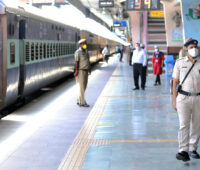With this essay, SSRC president Alondra Nelson inaugurates the Council’s Covid-19 and the Social Sciences essay forum. The discussion of how to reopen our societies in the wake of the Covid-19 pandemic poses special questions for social researchers, she argues. How do the social conditions exposed, exacerbated, and created by the novel coronavirus demand that we substantively rethink our ideas of society and, therefore, some of the prevailing assumptions of social science?
Starting with SSRC president Alondra Nelson’s reflections on “Society after Pandemic,” this series of essays explores the human, social, political, and ethical dimensions of Covid-19. These pieces call attention to how social research can shed light on the short- and long-term effects of the pandemic and what can be done to improve responses, both now and in the future.
The publication of this series would not be possible if not for the help of the following SSRC staff:
Juni Ahari, communications and editorial assistant.
Cole Edick, program associate, Anxieties of Democracy and Media & Democracy programs.
Carrie Hamilton, program assistant, Social Data Initiative and Media & Democracy program.
Saarah Jappie, program officer, Transregional Collaboratory on the Indian Ocean.
Michelle Lee, program assistant, International Dissertation Research Fellowship.
Line Sidonie Talla Mafotsing, communications and editorial assistant, African Peacebuilding Network and Next Generation Social Sciences in Africa.
Daniella Sarnoff, program director, International Dissertation Research Fellowship.
Catherine Weddig, program assistant, Social Data Initiative and Media & Democracy program.
Themes
Essays

Inequalities, Pandemic Technologies, and the State in Ecuador
by Michael D. Hill and Consuelo Fernández-SalvadorMany countries struggled with the impact of the Covid-19 pandemic as it overwhelmed health services and forced everyone into lockdown. In Ecuador, inadequate public funding for healthcare and longstanding unequal access to resources heightened the damage of the virus. Here, Michael D. Hill and Consuelo Fernández-Salvador examine how Ecuadorians adapted to the digital divide apparent in the shift to virtual classes and state abandonment in healthcare. They found people opted for collaboration, solidarity, and medical pluralism to tackle the inequalities heightened by the pandemic.

Viropolitics and Value(s): From Surviving to Living in San Francisco’s Shelter in Place Hotels
by Naomi C. SchoenfeldPeople experiencing homelessness (PEH) have been some of the most impacted by the Covid-19 pandemic; however, the crisis has also allowed for new opportunities to provide some of the most vulnerable with housing. Looking at San Francisco’s Shelter in Place Hotel Program, Naomi Schoenfeld argues that the pandemic created new viropolitical circumstances that made housing for PEH a priority to lessen the stress on local health systems. However, PEH and their advocates went further, Schoenfeld finds, applying a logic she calls viropragmatism to demand improved and more dignified housing options.

Cynicism, Care, Kindness: Contradictory Lessons from the Covid-19 Pandemic
by Lu Liu and Marjorie Faulstich OrellanaAs part of their SSRC-funded Covid-19 research, Lu Liu and Marjorie Orellana study the role care and kindness played during the pandemic. Through an ethnographic diary-based study, they investigate how US families are navigating the pandemic and what they are learning from it. These families, they found, gained new insights into the importance of care, focusing on self-care, family-care, and community-care.

A Relational Response to the Covid-19 Crisis: Perspectives from Two Case Studies in South Africa
by Marlie Holtzhausen and Cori WielengaAs part of their SSRC-funded Covid-19 research, Marlie Holtzhausen and Cori Wielenga examine what a relational approach can tell us about the efficiency of development interventions and how a relational approach can inform whether certain interventions are sustainable during a crisis. Looking at two development organizations in South Africa, they find that “success” for these organizations was not defined by a quantifiable measures like funds raised or people helped but by the dignity of the care and aid provided, which is possible thanks to a foundation of strong relationships.

Hate in the Time of the Virus: Covid-19, Fake News, and Islamophobia in India
by Anirban BaishyaThe Covid-19 pandemic triggered a new wave of Islamophobic rhetoric in India. Focusing on the aftermath of the March 2020 Tablighi Jamaat event, Anirban Baishya, with funding from the SSRC’s Rapid-Response Covid-19 grant, investigates how mis/disinformation and anti-Muslim messages spread through media, jumping from social media to mainstream outlets.

Web of Disinformation: Evangelical Christian Media and Covid-19 in Brazil
by Olívia Bandeira, Alex Pegna Hercog, Iury Batistta and Réia Sílvia Gonçalves PereiraAs part of their SSRC-funded research, Olívia Bandeira, Alex Hercog, Iury Batistta, and Réia Gonçalves Pereira investigate the impact of right-wing evangelical media on Brazil’s response to the pandemic, paying close attention to how mis/disinformation spread through mainstream and social media run by popular pastors. Echoing the rhetoric of the Bolsonaro government, evangelical media sowed doubt about Covid-19’s impact in Brazil and later distrust about the vaccine. Brazilian evangelical media mis/disinformation about Covid-19, the authors argue, signals support for Bolsonaro’s neoconservative project, which aligns with their beliefs, such as viewing Brazil as a “Christian nation” and bringing an end to the secular state.

Storytelling as a Bridge Between Impacted Communities and Data-Driven Policymakers
by Zoe Kahn and Joshua BlumenstockThe Covid-19 pandemic pushed many countries to employ novel methods for distributing aid to impacted communities, including new data-driven technological approaches. Using social impact scenarios, Zoe Kahn and Joshua Blumenstock’s research examines the unanticipated dynamics that may arise from data-driven technical policies. Looking at Togo’s scheme to provide aid via a data-driven system based on recipients’ mobile money accounts, they reveal 3 unanticipated dynamics in this approach that would potentially negatively impact who receives aid as well as how the target community perceives this policy.

The Effects of Reverse Migration on Indigenous Communities following India’s Covid-19 Lockdown
by Nishaant Choksi, Sukanya Deogam and Kalpesh RathwaNishaant Choksi, Sukanya Deogam and Kalpesh Rathwa’s research focuses on labor migrants from India’s “Scheduled Tribes”—mostly marginalized indigenous populations that depend on remittances. The authors look at differences both across and within two very different labor sending indigenous communities in terms of how they responded to the return of large numbers of migrants during the Covid-19 pandemic. One area of interest is the differing expectations of and orientations toward local government in the two communities in terms of handling dramatic socio-economic stresses caused by the reduction in remittances and the reintegration of migrants.

Lessons on Information from Covid-19 Contact Tracing
by Alex Sanchez, Theo Loftis, Jenny Lee, Amelia Mauldin, Andrea Ngan, Feini Yin, Bo Guang and Jessa LingelContact tracing proved an invaluable tool during the height of the Covid-19 pandemic in many US states to help curtail the virus’s spread and inform those potentially exposed. However, many of these efforts did not consider how information gathering can also be an opportunity for information sharing. Alex Sanchez, Theo Loftis, Jenny Lee, Amelia Mauldin, Andrea Ngan, Bo Guang, and Jessa Lingel, through interviews with tracers and tracees in Philadelphia and Providence, examine the dynamics present when people are contacted about their health information and suggest interventions for the problems encountered.











